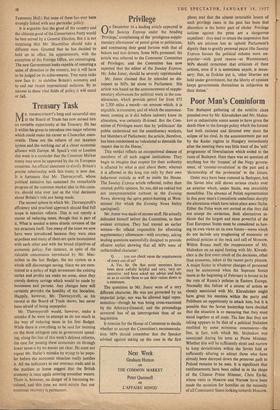Treasury Task
mR. THORNEYCROFT'S long and successful stay at the Board of Trade has now earned him an enviable opportunity at the Treasury. He has it within his grasp to introduce two major reforms which could make his career as Chancellor mem- orable. These are the reform of our taxation system and the working out of a closer economic alliance with Europe. M. Spailk's visit to London this week is a reminder that the Common Maiket treaty may soon be approved by the six European countries. An official statement to clarify Britain's precise relationship with this treaty is now due. It is fortunate that Mr. Thorneycroft, whose political initiative has sustained the remarkable progress of the common market idea in this coun- try, should take over just as the vital decisions about Britain's role are being made.
The second sphere in which Mr. Thorneycroft's efficiency and practical approach should find full scope is taxation reform. This is not merely a matter of reducing taxes, though that is part of it. What is needed is some drastic revision of the tax structure itself. Too many of the taxes we now have were introduced because they were once expedient and many of them are quite inconsistent with each other and with the broad objectives of economic policy. For instance, in spite of the valuable concessions introduced by Mr. Mac- millan in the last Budget, the tax system as a whole still discourages saving. Since we are com- mitted to a policy of high investment the existing surtax and profits tax make no sense, since they merely destroy savings which would be made by businesses and persons. Any changes here will certainly provoke the hostility of the Socialists. Happily, however, Mr. Thorneycroft, as his record at the Board of Trade shows, has never been afraid of being unpopular.
Mr. Thorneycroft would, however, make a mistake if he were to attempt to do too much in the way of reducing taxes in his first Budget. While there is everything to be said for insisting on the most stringent cuts in government spend- ing, along the line of this week's defence reforms, the case for passing these economies on through lower taxes is by no means yet clear. He must not repeat Mr. Butler's mistake by trying to be popu- lar before the economic situation really justifies it. All the indicators in our overseas trade and in the position at home suggest that the British economy is once again entering smoother waters.
There is, however, no danger of it becoming be- calmed, and this time we must ensure that our economic recovery is permanent.


































 Previous page
Previous page